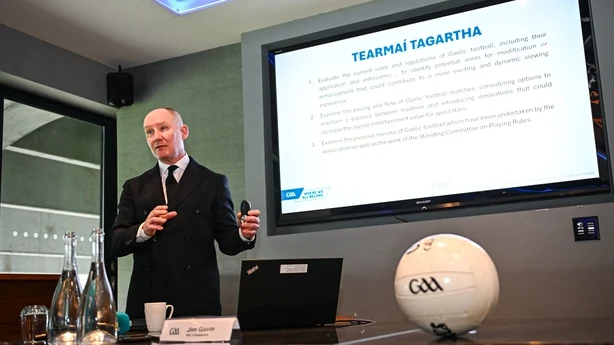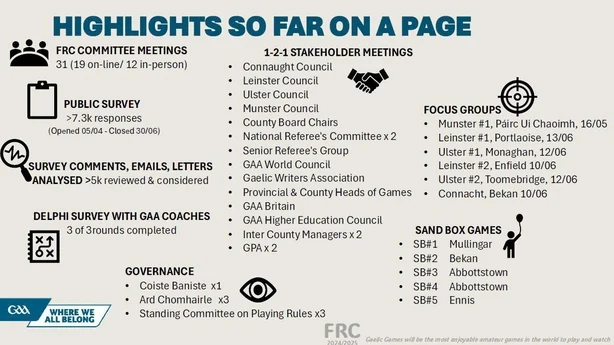The GAA's Football Review Committee is considering changes to the rules that would make tactical fouls a black-card offence and replacing penalty shootouts or even extra-time with an 'overtime showdown’.
Its wide-ranging proposals, which are still under debate by the committee itself, include multiple possible rule changes intended to reward attacking play and kick passing as part of one of the stated goals to "examine the pacing and flow of Gaelic football matches, considering options to maintain a balance between tradition and introducing innovations that could increase the overall entertainment value for spectators."
The FRC’s other core proposals, many of which have been previously flagged, are:
- Four points for a goal and two points for a score from outside or on the 20-metre line and a 40-metre arc, measured from the centre of the goal. 45s would remain one point but regular frees could be worth two.
- Both teams must keep three players (not including the goalkeeper) inside each 65, or possibly a new halfway line, at all times
- Goalkeepers can only receive the ball in the large rectangle or after passing their own 65
- Kickouts to be taken from the 20m line and go forward outside the arc
- A black-card for holding/grabbing the jersey if deemed a tactical foul, and the ball brought forward 50 metres. Contributing to a melee to become a black-card offence and making head-to-head contact with an opponent a red
- A player, or one of their team-mates, can elect to ‘solo and go’ rather than take a free-kick when fouled
- The advanced mark will only apply within the 20-metre line and automatic advantage will apply, encouraging forwards to continue play
- Matches to be timed by a countdown clock, that the referee can stop, and concluded by a hooter - as in Ladies football - signalling the end of the game, likely once the ball next goes out of play
- Penalty shootouts, and possibly extra-time, to be replaced by an ‘overtime showdown’ next-score-wins format, or one where the conceding team has one opportunity to match their opponents' score and prolong the additional period
- Throw-ins to start a half will be contested by just one player from each team, with another on the sideline, and all others behind the 65m lines
- Teams can introduce six substitutes, rather than the current five
- Line umpires can bring incidents to the referee's attention at any time, rather than waiting for a break in play
- ‘Forceful’ on-field dissent would be punished by bringing the ball forward 50 metres, rather than the current 30, while dissent from team officials or panel members on the sideline would result in an automatic 13m free
- Players have to hand the ball to a fouled opponent, rather than dropping it or kicking it away
- The square-ball rule would be standardised, meaning players could enter the large rectangle once the ball was kicked, regardless of whether it was in open play or from a free-kick
The proposed rule changes were explained in a briefing today to the Gaelic Writers’ Association by Jim Gavin, the six-time All-Ireland-winning former Dublin manager now chairing the FRC, whose members included the likes of former Donegal star Michael Murphy, ex-inter-county managers Eamonn Fitzmaurice, Colm Collins and James Horan, and incoming Tyrone boss Malachy O’Rourke.

Gavin said that there had been 7,500 responses to a public survey, followed by a series of surveys and focus groups with coaches and players, and stakeholder meetings with the GAA’s various units.
"People like the game but there are specific elements they want to see enhanced," said Gavin.
"They like kick-passing, they like long-range scores, they like high-fielding, they like creativity and they like goals."
Trial games took place between club sides in Mullingar, Bekan (Mayo), National Games Development Centre (x2) and Ennis over the summer, where the proposed rules were tweaked.
Despite the numerous proposed changes, some often-debated elements of the game are not on the agenda.
Gavin said referees had warned that counting handpasses would be impractical and that stricter enforcement of the existing ‘four-step’ rule might be a preferable way to encourage turnovers.
Shot-clock and basketball-style 'back-court' rules were among those considered but not favoured.
Defining the tackle is seen as a complex area that will be explored in more detail next year.

Gavin was at pains to emphasise that the committee had not yet finalised its draft report, which will be submitted to Ard Comhairle (Central Council) for consideration, which will be briefed again following trials in inter-provincial games on 18 and 19 October.
A special congress will then take place on 30 November to vote on introducing the final versions of the new rules for all competitions in 2025, with a mid-season review ahead of permanent adoption from 2026.
Each of the proposed changes will require an individual vote of over 60% at congress but Gavin insisted the FRC does not see any one rule getting through as more important than the others.
"We'll be very considered in what we suggest," he said. "We won't put any recommendation forward that we don't believe should be passed.
"We're not going to put 20 in and hope we get five over. We see them very much as inter-dependent."
He added that the changes were being formulated to apply to all levels of the game from 1 January 2025 but that they could be staggered for clubs and that rules such as the 3-up/3-back could possibly end up only applying to inter-county level, where there are always multiple officials.
"Obviously, there is a challenge there if a referee is on their own. But we did notice that it becomes self-policing, that players will call out to the referee [if opponents are not keeping three players back]."
The FRC is only concerned with Gaelic football but as a member of the standing committee on playing rules, Gavin is aware that there could be calls for similar changes in hurling, particularly if measures such as the new scoring system, dissent penalties and overtime showdown are adopted.
Disclaimer: The copyright of this article belongs to the original author. Reposting this article is solely for the purpose of information dissemination and does not constitute any investment advice. If there is any infringement, please contact us immediately. We will make corrections or deletions as necessary. Thank you.






